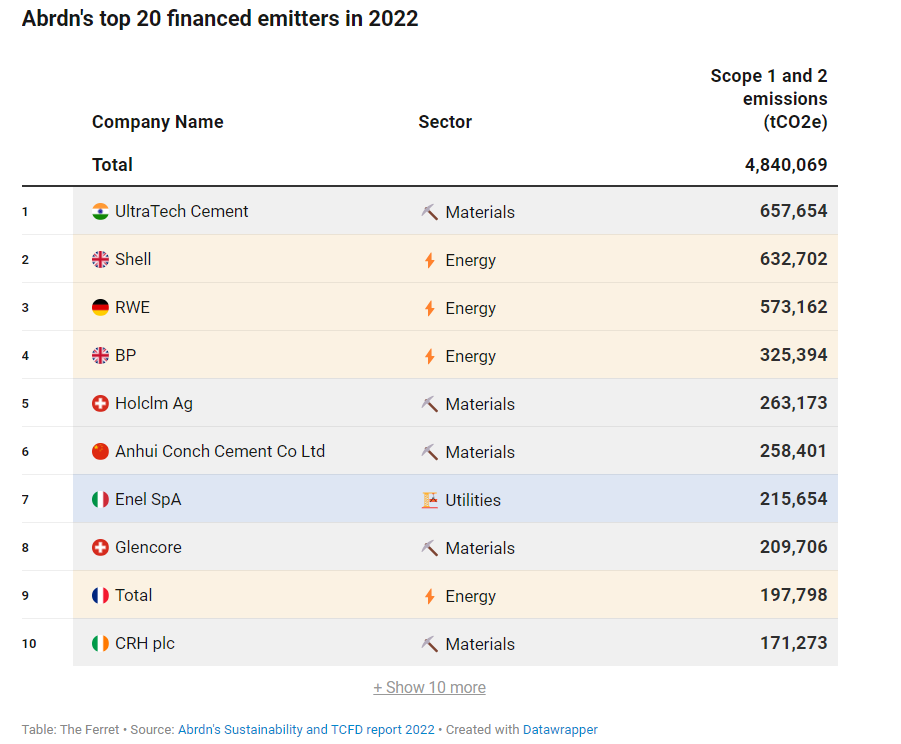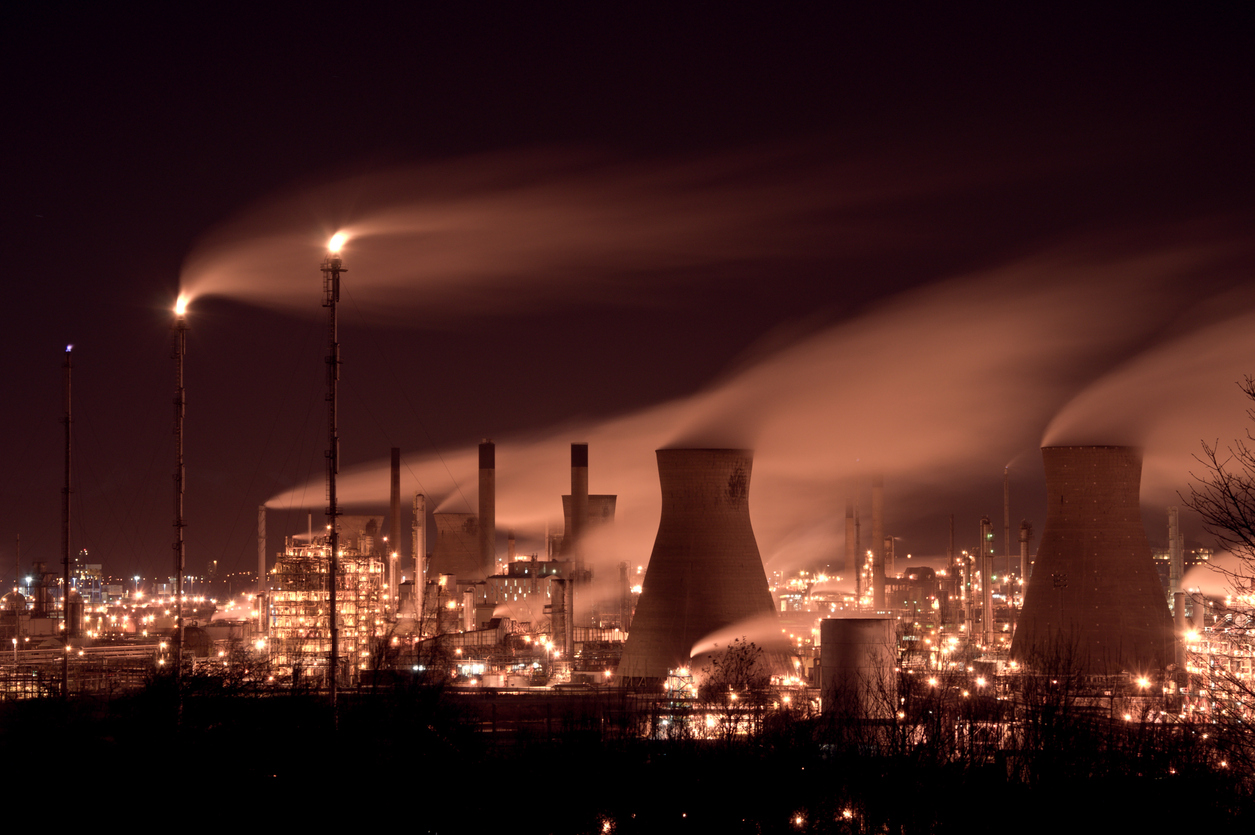An Edinburgh financial giant’s investments in 20 firms indirectly caused nearly five million tonnes of climate pollution in 2022 — significantly more than the amount produced annually at Grangemouth, Scotland’s dirtiest industrial site.
Asset manager, Abrdn – known as Standard Life Aberdeen until 2021 – has stakes in some of the world’s biggest polluters including the oil multinationals Shell and BP, German coal firm, RWE, and global mining companies, Glencore and Rio Tinto.
Abrdn’s investments in the 20 highest polluting companies in its portfolio resulted in the equivalent of 4.8 million tonnes of carbon dioxide (CO2) entering the atmosphere in 2022.
By comparison, the array of petrochemical facilities at Grangemouth – which together create more climate pollution than any other industrial site in Scotland – produce the equivalent of 2.7 million tonnes of CO2 annually.
Campaigners said the revelations were “shocking” and argued that Scotland “cannot claim to be a leader on climate action whilst this kind of damage is bankrolled from our own institutions”.
One activist said that the company’s clients “should start considering whether Abrdn really has their best interests in mind”.
Abrdn claimed it is “committed to driving the change” required to meet climate targets and currently manages “£37bn in sustainable assets”. A spokesperson added the company could “mitigate exposure to coal and fossil fuels” if requested by specific clients.
Scotland cannot claim to be a leader on climate action whilst this kind of damage is bankrolled from our own institutions.
Ric Lander, Friends of the Earth Scotland
The findings come from a Ferret analysis of Abrdn’s own sustainability report, which includes a list of its top 20 ‘financed emitters’. This shows the amount of greenhouse gas emissions its funding of these companies facilitated in 2022.
Abrdn has not publicly disclosed its total ‘financed emissions’ across all of its investments, although this figure is likely to be much higher than 4.8 million tonnes.
Abrdn’s dirtiest investments in a single company in 2022 were in UltraTech Cement, a Mumbai-based cement maker. Its holdings in UltraTech caused about 660,000 tonnes of climate pollution to enter the atmosphere last year.
For context, Abrdn’s funding of UltraTech caused only slightly fewer emissions than ExxonMobil’s ethylene plant at Mossmorran in Fife, which produces 680,000 tonnes annually, according to the most recent data from Scotland’s environmental regulator.
Investments in Shell, RWE, and BP were the second, third and fourth most polluting in Abdrn’s portfolio respectively.

Shell and BP came under fire in recent months after weakening previous climate commitments after posting huge profits on the back of the energy crisis.
In June, Shell announced it was dropping a pledge to cut oil production by between one and two per cent each year until 2030. The company told The Ferret its commitment to climate targets “remains as strong as it ever was” and it had already met the oil reduction target by selling oil assets in 2021.
Earlier this year, BP watered down a commitment to reduce its climate impact by 40 per cent by the end of the 2020s.
Senior figures at the Church of England cited the reversals by Shell and BP as a key driver for its decision last month to drop its investments in oil and gas companies.
RWE made global headlines in January after activists were forcibly removed from the German village of Lutzerath by police so it could be demolished to make room for the expansion of one of the company’s mines. Greta Thunberg was among the protesters detained by police.
In 2021, RWE was Europe’s biggest polluting company. But the says it is a “leading player in renewables”, has a “clear goal to be climate neutral by 2040” and will stop generating power from coal by 2030.
Abrdn’s stakes in Glencore and Rio Tinto were collectively responsible for nearly 370,000 tonnes of climate pollution last year.
Glencore is the world’s largest mining company and coal trader. It has been accused of human rights and environmental abuses in recent years.
London-headquartered Rio Tinto has also faced a series of scandals in the last decade.
In February 2022, the company released findings of an external review of its workplace culture which found instances of sexual harassment, bullying and racism “throughout the company”.
According to responses from employees, 28 per cent of women and nearly seven per cent of men had experienced sexual harassment at work at Rio Tinto in the five years before the report was released.
In 2020, the company also admitted to blowing up a 46,000-year-old Aboriginal heritage site in Western Australia as part of an effort to access iron ore reserves.
Abrdn’s commitment to sustainable investing has come under increasing scrutiny as the climate crisis intensifies.
Earlier this year The Ferret revealed the company owns a large number of bonds issued by the embattled Indian coal conglomerate, Adani Group.
Protesters from the activist group Toxic Bonds targeted the company’s annual general meeting in May, with campaigners claiming that “Abrdn is taking advantage of the bond market to fund coal, oil and gas expansion”.
According to financial market research conducted by the German environmental organisation, Urgewald, Abrdn holds £920m worth of bonds issued by companies who are growing their fossil fuel operations.
Urgewald’s head of finance research, Katrin Ganswindt, said the findings about Abdrn’s investments are “concerning”, but come as “no surprise” because the company has no policy to exclude coal, oil and gas investments.
“Abrdn’s primary strategy seems to be client engagement,” Ganswindt told The Ferret. “They claim to set clear targets and to consider divestment if these are not met. But what about cases like Shell and BP, which have no intention to reduce oil and gas expansion or production, yet Abrdn stays invested?”
Lara Cuvelier, a sustainable finance campaigner at Reclaim Finance, also claimed that Abrdn “don’t appear to have a proper engagement policy to push fossil fuel companies to change”.
Cuvelier added: “They are one of the big asset managers that still invest in new bonds from companies like BP, Shell and Glencore without imposing any conditions.
“Their clients should start considering whether Abrdn really has their best interests in mind.”
Friends of the Earth Scotland’s divestment campaigner, Ric Lander, agreed that the findings showed if “you care about the climate you should look elsewhere than Abrdn”.
“It’s shocking that a Scottish investor is backing some of the world’s biggest polluters,” Lander said. “Scotland cannot claim to be a leader on climate action whilst this kind of damage is bankrolled from our own institutions.”
“Our money should be nowhere near companies like Glencore. Countless investors, such as Norway’s sovereign wealth fund, have already divested from Glencore and there are plenty of fossil-free funds on the market.”
clients should start considering whether Abrdn really has their best interests in mind.Lara Cuvelier, Reclaim Finance
An Abrdn spokesperson noted the company had launched a “multi-year engagement strategy with our largest financed emitters” to encourage their transition to net zero.
They added: “In cases where we do not see appropriate progress, we may use tools such as our voting powers to drive change. Where clients mandate, we can mitigate our exposure to coal and fossil fuels.”
“As a responsible investor managing assets on behalf of many clients with different mandates and investment objectives, we believe it is important for asset managers to assess whether it is appropriate to impose targets and restrictions where they have not been mandated by the client.
“However, we do offer a variety of funds and investments for clients who wish to invest in line with specific sustainable criteria. We currently manage £37bn in sustainable assets.”
A Glencore spokesperson said: “We aim to respect human rights and seek to learn about the traditions, cultures, perspectives and development priorities of people with whom we engage, to build trusting and constructive long-term relationships, and to contribute to the social and economic development of affected people and society more widely.
“We recognise our responsibility to contribute to the global effort to achieve the goals of the Paris Agreement by decarbonising our own operational footprint.”
UltraTech, BP and Rio Tinto have been asked to comment.
Main image: piotr_ku/iStock














